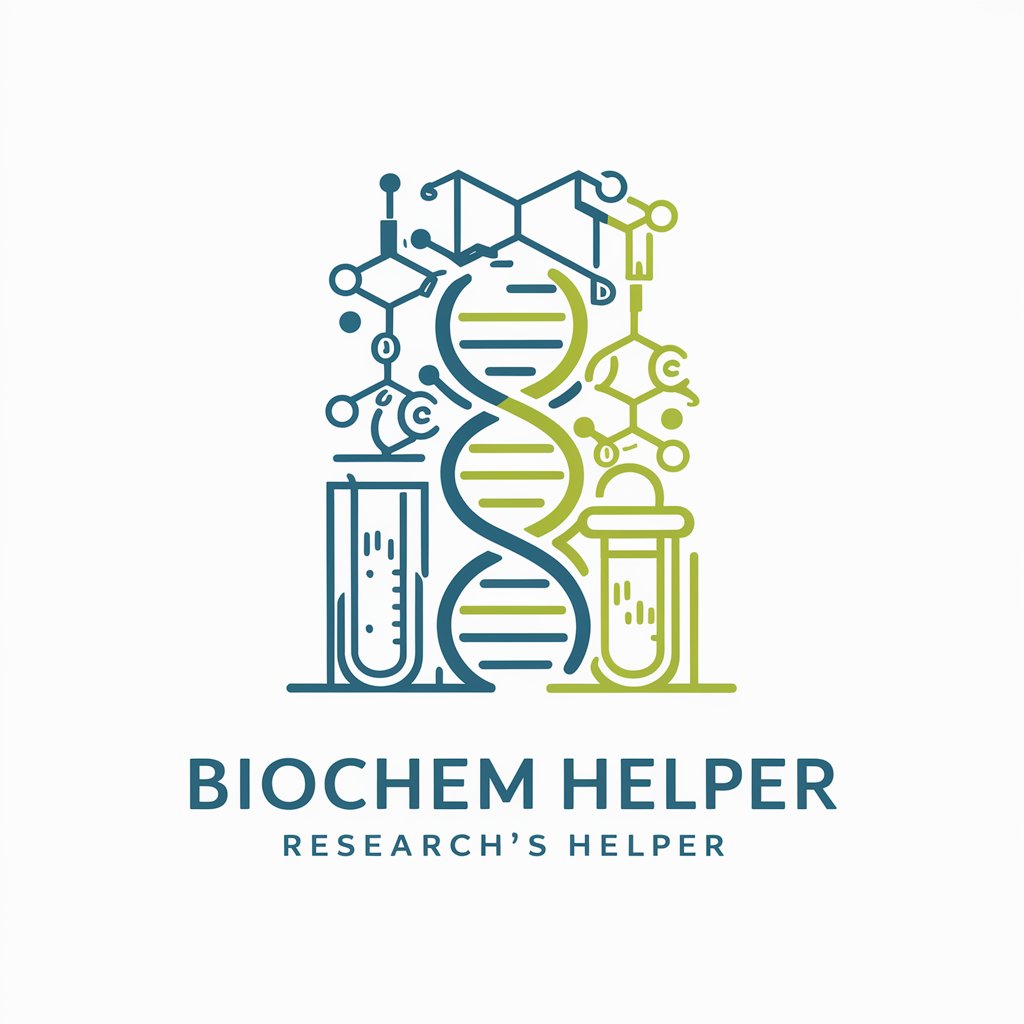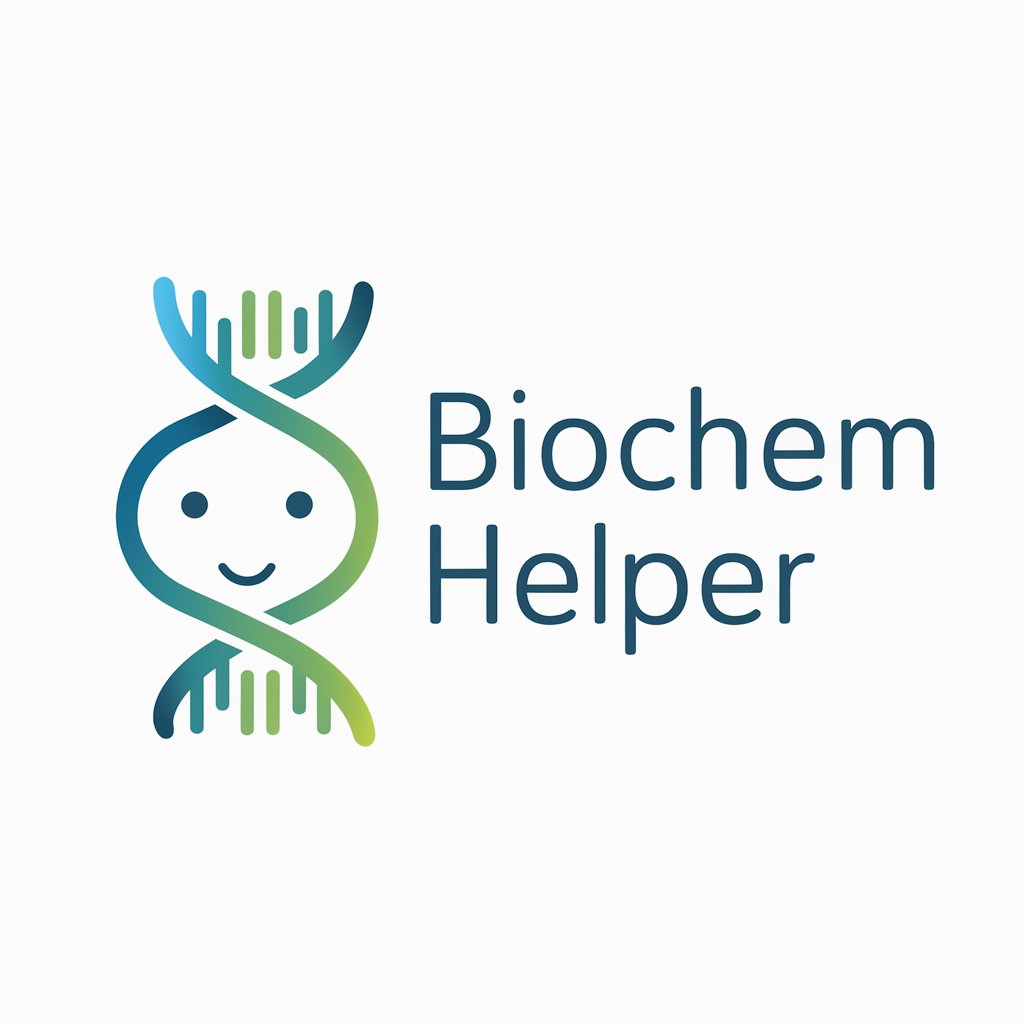Biochem Helper: Research's Helper - Tailored Biochemical Guidance

Hello! I'm here to assist with your biochemical engineering needs.
Empowering research with AI-driven biochemical insights.
Explain the principles behind enzymatic catalysis in biochemical engineering.
What are the best practices for scaling up bioreactor operations?
How do you optimize downstream processing for high yield and purity?
Describe the role of metabolic engineering in synthetic biology.
Get Embed Code
Overview of Biochem Helper: Research's Helper
Biochem Helper: Research's Helper is designed to assist biochemical engineers and researchers by providing in-depth insights and guidance on a wide range of biochemical engineering concepts. Its core purpose is to facilitate the research and development process within the biochemical field, offering tailored advice on industry-standard practices, experimental design, data analysis, and problem-solving strategies. This GPT's expertise encompasses various aspects of biochemical engineering, including enzyme kinetics, bioreactor design, metabolic engineering, and bioprocess optimization. For example, a researcher working on enzyme catalysis could receive detailed explanations of Michaelis-Menten kinetics, along with advice on setting up assays to determine kinetic parameters. Similarly, a team designing a new bioreactor could obtain guidance on selecting the appropriate reactor configuration and operating conditions to optimize product yield. Powered by ChatGPT-4o。

Core Functions of Biochem Helper: Research's Helper
Conceptual Clarification and Theoretical Insights
Example
Explaining the principles of metabolic pathway engineering.
Scenario
A researcher is developing a genetically modified microorganism for enhanced biofuel production. They need to understand how metabolic pathway engineering can be applied to increase the yield of the desired product. Biochem Helper provides a detailed overview of relevant strategies, such as the introduction of synthetic pathways and the knockdown of competing pathways.
Guidance on Experimental Design and Data Analysis
Example
Advising on the design of fermentation experiments.
Scenario
An engineer is tasked with optimizing the fermentation conditions for a new probiotic strain. They seek advice on designing experiments to test various nutrient formulations and oxygen levels. Biochem Helper offers suggestions on setting up a factorial design experiment and analyzing the data to identify the most effective conditions.
Problem-Solving Strategies
Example
Addressing issues in bioprocess scale-up.
Scenario
A bioprocess engineer encounters difficulties in scaling up a biocatalytic process from lab to pilot scale, experiencing lower yields. The engineer requests strategies to identify and mitigate the scale-up issues. Biochem Helper suggests a systematic approach to evaluate the impact of mixing, oxygen transfer, and substrate inhibition at larger scales and recommends adjustments to improve the process performance.
Industry-Standard Practices
Example
Ensuring compliance with regulatory requirements.
Scenario
A start-up company is developing a new therapeutic protein and needs guidance on regulatory requirements for clinical trials. Biochem Helper provides an overview of the necessary documentation and quality control measures required by regulatory agencies, helping the team navigate the complex approval process.
Target User Groups for Biochem Helper: Research's Helper
Academic Researchers
Students, faculty, and post-doctoral researchers engaged in biochemical engineering research. They benefit from the GPT's ability to clarify complex concepts, suggest literature sources, and provide guidance on experimental design, thereby enhancing the quality and efficiency of their research projects.
Industry Professionals
Biochemical engineers and bioprocess scientists working in industries such as biotechnology, pharmaceuticals, and food processing. These users benefit from the GPT's insights on process optimization, scale-up strategies, and regulatory compliance, supporting innovation and problem-solving in product development and manufacturing processes.
Educators and Trainers
Professors and instructors teaching biochemical engineering and related fields. They can leverage the GPT to develop teaching materials, design course content, and create real-world problem-solving exercises for students, enhancing the learning experience.

How to Use Biochem Helper: Research's Helper
1
Access the platform for a complimentary trial at yeschat.ai, no signup or ChatGPT Plus required.
2
Select the Biochem Helper: Research's Helper option from the available tools to start your session.
3
Enter your query in the provided text box. Be specific about your biochemical engineering needs for the most accurate assistance.
4
Review the generated response. Utilize the feedback for your research, project planning, or problem-solving tasks.
5
For further inquiries or follow-up questions, repeat the process. The tool is designed to accommodate a wide range of biochemical engineering topics.
Try other advanced and practical GPTs
Biochem Helper
Deciphering Biochemistry with AI

Biological Science Teacher GPT
Empowering Biological Learning with AI

Biophysicist Assistant
Unlocking Biophysics with AI

Bookbind Buddy: Helper for creating books
Craft Your Books with AI-Powered Precision

Brokerage Clerk Helper: Daily Task Solver
Streamlining Brokerage Tasks with AI

Budget Buddy: Pro Budget Analysis
Empowering Financial Decisions with AI

Account Aid: Helper to get paid
Streamline Your Collections with AI

Barber Boss Bot
AI-powered Barber Business Assistant

Bakers Best Bud
Baking Made Easy with AI-Powered Guidance

Baker's Helper
Elevate Your Baking with AI

Bailiff Bot
Empowering Bailiffs with AI-Driven Guidance

Title Trailblazer
Streamlining Title Examination with AI

Frequently Asked Questions About Biochem Helper: Research's Helper
What kind of questions can I ask Biochem Helper: Research's Helper?
You can ask any biochemical engineering-related questions, ranging from theoretical concepts, application of techniques, to guidance on laboratory protocols and industry-standard practices.
Is Biochem Helper: Research's Helper suitable for students?
Absolutely. The tool is designed to assist both students and professionals by providing detailed explanations, simplifying complex concepts, and offering study and research guidance.
Can this tool help with experimental design?
Yes, it offers support in experimental planning, including suggesting appropriate methods, expected outcomes, and considerations for reproducibility and validity.
How does Biochem Helper: Research's Helper stay updated with current practices?
While it does not browse the internet, the tool is periodically updated with the latest research, best practices, and trends within the field of biochemical engineering.
Is there a limit to the number of queries I can make?
No, users are encouraged to ask as many questions as needed to fully understand their topic of interest or solve their specific issues.
